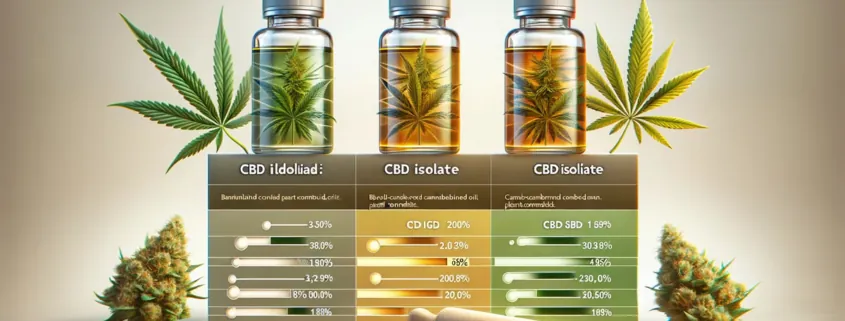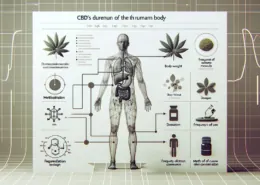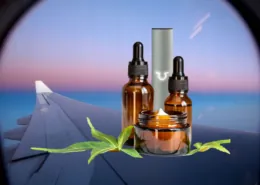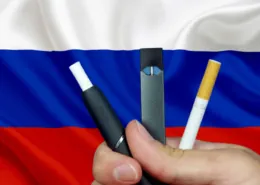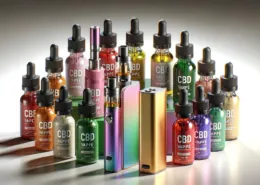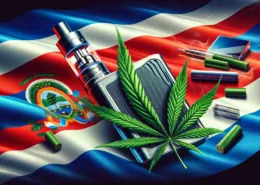A Comprehensive Guide to Different Types of CBD Oil
The rising popularity of cannabidiol (CBD) has led to a surge in the variety of CBD products available on the market. However, this abundance of options can often lead to confusion, as the terminology used to describe these products is not always clear or consistent. In this comprehensive guide, we’ll dive into the world of CBD, explore the different types of CBD oil, and help you understand the key differences between them. By the end of this article, you’ll be equipped with the knowledge to make informed decisions when selecting a CBD product that aligns with your individual needs and preferences.
Understanding CBD Terminology
Before we delve into the various types of CBD oil, it’s essential to familiarize yourself with some common CBD-related terms that you may encounter while researching or shopping for CBD products.
CBD Concentrates
CBD concentrates are highly potent extracts that contain a high percentage of cannabidiol, ranging from 45% to 99.9% (1). These concentrates are created through various extraction methods, which aim to isolate and concentrate the desired compounds from the cannabis plant. CBD concentrates come in a variety of forms, each with its own unique texture, appearance, and method of consumption. Some common forms of CBD concentrates include:
| Concentrates | Description |
|---|---|
| Crumble | A dry, crumbly texture that easily breaks apart. |
| Crystals and isolate | Pure, crystalline CBD that has been isolated from all other plant compounds. |
| Distillate | A highly refined, liquid form of CBD that has been distilled to remove impurities. |
| Extract (CBD oil) | A liquid form of concentrated CBD, often used as a base for other products. |
| Shatter | A glass-like, brittle texture that breaks easily. |
| Wax | A soft, pliable texture that can be easily manipulated. |
It’s important to note that while all CBD extracts are considered concentrates, not all concentrates are extracts. The term “concentrate” refers to the high concentration of CBD, while “extract” refers to the method of obtaining the CBD from the plant.
Raw CBD Oil
Raw CBD oil is a type of CBD oil that is created using a solvent-free, heat-free extraction process, typically involving CO2. This gentle extraction method preserves the full spectrum of the plant’s cannabinoids, including CBD and its acidic precursor, cannabidiolic acid (CBDa). Additionally, raw CBD oil retains the terpenes and pigments found naturally in the cannabis plant (2).
The presence of CBDa in raw CBD oil is significant, as this compound is believed to have unique therapeutic properties. CBDa has been shown to have anti-inflammatory and anti-nausea effects, making it a promising compound for various health applications (3). However, it’s important to note that CBDa is not psychoactive and does not convert to CBD unless exposed to heat, a process known as decarboxylation.
PCR Hemp Oil (or PCR CBD Oil)
PCR stands for phytocannabinoid-rich, referring to the wide range of cannabinoids found in the oil. Phytocannabinoids are cannabinoids that are naturally produced by plants, as opposed to endocannabinoids, which are produced by the human body. The terms PCR hemp oil and PCR CBD oil are often used interchangeably with “full-spectrum CBD” or “full-spectrum hemp oil” (4).
The main advantage of PCR hemp oil or PCR CBD oil is that it contains a diverse array of cannabinoids, terpenes, and other beneficial plant compounds. This diversity is believed to contribute to the “entourage effect,” a theory suggesting that the various compounds in cannabis work synergistically to enhance the overall therapeutic benefits (5).
The Three Main Types of CBD Oil
When it comes to CBD oil, there are three primary categories, each with its own unique characteristics and potential benefits:
- CBD Isolate
- Full-Spectrum CBD Oil
- Broad-Spectrum CBD Oil
The main difference between these types of CBD oil lies in their cannabinoid content and the presence or absence of other plant compounds.
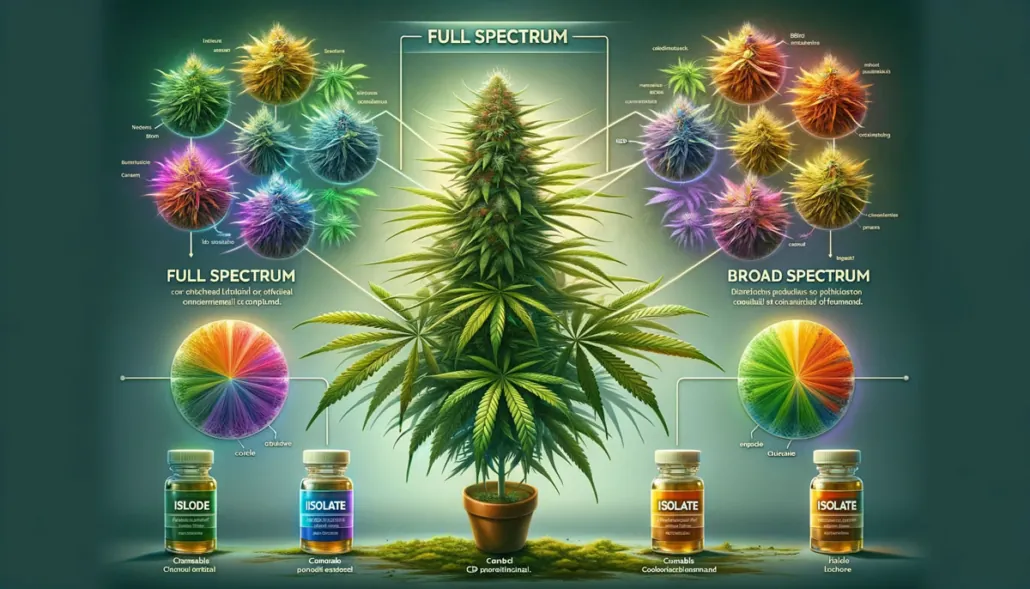
CBD Isolate
CBD isolate is the purest form of CBD, containing only cannabidiol without any other cannabinoids, terpenes, or plant compounds. It is often sold as a crystal or powder and can be consumed by placing it under the tongue, adding it to food and beverages, or mixing it with a carrier oil for topical application (6).
The main advantages of CBD isolate are its versatility, affordability, and the absence of THC, which may be important for those who undergo drug testing or are sensitive to the effects of THC. CBD isolate allows for precise dosing and can be easily incorporated into various products, such as edibles, capsules, and topicals.
However, CBD isolate lacks the potential benefits of the entourage effect, as it does not contain the full spectrum of cannabinoids and terpenes found in the cannabis plant. Some studies suggest that the therapeutic effects of CBD may be more pronounced when combined with other plant compounds (7).
Full-Spectrum CBD Oil
Full-spectrum CBD oil contains CBD along with all other cannabinoids, terpenes, and plant compounds that naturally occur in the cannabis plant. This includes trace amounts of THC, although the concentration is typically below 0.3%, which is not enough to produce psychoactive effects (8).
The primary benefit of full-spectrum CBD oil is the potential for the entourage effect, as the various plant compounds work together to enhance the overall therapeutic benefits. Studies have shown that full-spectrum CBD oil may be more effective than CBD isolate in treating certain conditions, such as chronic pain and inflammation (9).
However, the presence of THC in full-spectrum CBD oil may be a concern for some individuals, as it can show up on drug tests and may cause unwanted side effects in sensitive individuals. It’s crucial to carefully consider your personal circumstances and consult with a healthcare professional before using full-spectrum CBD oil.
Broad-Spectrum CBD Oil
Broad-spectrum CBD oil is a middle ground between CBD isolate and full-spectrum CBD oil. It contains all the cannabinoids and plant compounds found in full-spectrum CBD oil, with the exception of THC, which is removed during the final stages of processing (10).
Broad-spectrum CBD oil offers the potential benefits of the entourage effect without the risk of consuming THC. This makes it an attractive option for those who want to experience the synergistic effects of multiple plant compounds but wish to avoid THC for personal, professional, or legal reasons.
However, it’s important to note that broad-spectrum CBD oil may be more difficult to find compared to other types of CBD oil, as the THC removal process requires additional refinement and processing.
CBD Carriers: Oils vs. Tinctures
In addition to the different types of CBD oil, it’s important to understand the distinction between CBD oils and tinctures, which are often mistaken for one another.
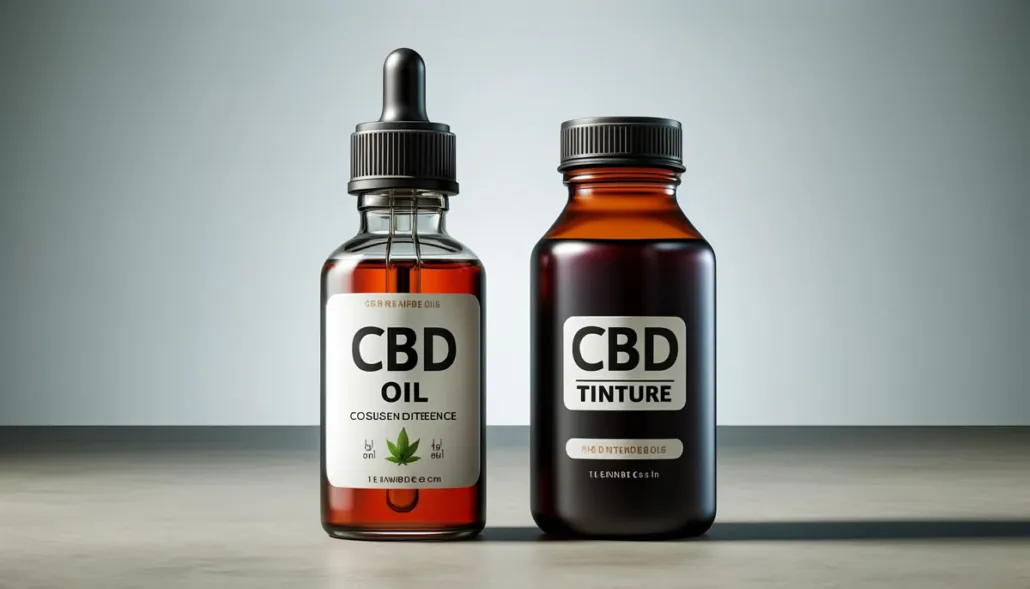
CBD Oil
CBD oil is created by extracting CBD and other beneficial compounds from the cannabis plant and then infusing them into a carrier oil, such as coconut oil, hemp seed oil, MCT oil, or olive oil. The carrier oil serves as a base for the CBD and helps to improve its bioavailability, making it easier for the body to absorb and utilize the cannabinoids (11).
CBD oils are typically taken sublingually, meaning they are placed under the tongue and held there for 30-60 seconds before swallowing. This method allows for quick absorption into the bloodstream through the mucous membranes in the mouth.
CBD Tincture
CBD tinctures, on the other hand, use alcohol as the carrier base instead of oil. To create a CBD tincture, the cannabis plant material is steeped in high-proof grain alcohol and heated over low heat for an extended period. This process allows the plant compounds to infuse into the liquid, creating a concentrated CBD tincture.
After the infusion process, the alcohol is then burned off, leaving behind a potent CBD tincture. Tinctures generally have a longer shelf life compared to oils, as the alcohol acts as a preservative and prevents the growth of bacteria and other microorganisms (12).
CBD tinctures are often preferred by those who dislike the taste of CBD oil or find it difficult to hold the oil under their tongue for the recommended time. Tinctures can be easily mixed into food or beverages, making them a convenient option for those on the go.
Choosing the Right CBD Product
With so many different types of CBD oil and related products available, it can be overwhelming to determine which one is right for you. When selecting a CBD product, consider the following factors:
- Your individual needs and preferences: Think about why you are using CBD and what you hope to achieve. Different types of CBD oil may be better suited for specific concerns, such as chronic pain, anxiety, or sleep issues.
- The legality of THC in your jurisdiction: Make sure to familiarize yourself with the laws regarding THC in your area, as this will determine whether you can legally use full-spectrum CBD oil or if you should opt for broad-spectrum or isolate options.
- The potential for drug testing: If you are subject to drug testing for work or other reasons, it’s crucial to choose a CBD product that is THC-free, such as broad-spectrum CBD oil or CBD isolate, to avoid a positive test result.
- The desired potency and concentration of CBD: Consider how much CBD you want to consume per serving and choose a product that aligns with your dosage goals. Keep in mind that higher potency products may be more cost-effective in the long run, as you will need to use less product to achieve the desired effects.
- The reputation and transparency of the CBD manufacturer: Always purchase CBD products from reputable companies that provide third-party lab testing results and are transparent about their manufacturing processes. Look for brands that use organic, non-GMO hemp and employ sustainable farming practices.
It’s always advisable to consult with a healthcare professional experienced in cannabis medicine before starting a CBD regimen. They can help you determine the most suitable type of CBD oil for your specific needs, recommend an appropriate dosage, and monitor your progress over time.
Conclusion
As the CBD market continues to expand, it’s more important than ever to understand the differences between the various types of CBD oil and related products. By familiarizing yourself with CBD terminology and the unique characteristics of CBD isolate, full-spectrum CBD oil, and broad-spectrum CBD oil, you can make an informed decision when selecting a product that aligns with your individual needs and preferences.
Remember to always purchase CBD products from reputable sources, look for third-party lab testing results, and consult with a healthcare professional to ensure safe and effective use. With this knowledge in hand, you can confidently navigate the world of CBD and harness its potential benefits for your overall health and well-being.
Whether you are seeking relief from chronic pain, looking to manage stress and anxiety, or simply aiming to support your overall wellness, CBD oil may offer a natural and promising solution. By taking the time to educate yourself and choose the right product for your needs, you can unlock the potential of this versatile and increasingly popular natural remedy.
References
1. Chandra, S., Lata, H., ElSohly, M. A., Walker, L. A., & Potter, D. (2017). Cannabis cultivation: Methodological issues for obtaining medical-grade product. Epilepsy & Behavior, 70, 302-312. https://doi.org/10.1016/j.yebeh.2016.11.029
2. Aizpurua-Olaizola, O., Soydaner, U., Öztürk, E., Schibano, D., Simsir, Y., Navarro, P., Etxebarria, N., & Usobiaga, A. (2016). Evolution of the Cannabinoid and Terpene Content during the Growth of Cannabis sativa Plants from Different Chemotypes. Journal of Natural Products, 79(2), 324-331. https://doi.org/10.1021/acs.jnatprod.5b00949
3. Bolognini, D., Rock, E. M., Cluny, N. L., Cascio, M. G., Limebeer, C. L., Duncan, M., Stott, C. G., Javid, F. A., Parker, L. A., & Pertwee, R. G. (2013). Cannabidiolic acid prevents vomiting in Suncus murinus and nausea-induced behaviour in rats by enhancing 5-HT1A receptor activation. British Journal of Pharmacology, 168(6), 1456-1470. https://doi.org/10.1111/bph.12043
4. Russo, E. B. (2011). Taming THC: potential cannabis synergy and phytocannabinoid-terpenoid entourage effects. British Journal of Pharmacology, 163(7), 1344-1364. https://doi.org/10.1111/j.1476-5381.2011.01238.x
5. Russo, E. B. (2019). The Case for the Entourage Effect and Conventional Breeding of Clinical Cannabis: No “Strain,” No Gain. Frontiers in Plant Science, 9, 1969. https://doi.org/10.3389/fpls.2018.01969
6. Corroon, J., & Kight, R. (2018). Regulatory Status of Cannabidiol in the United States: A Perspective. Cannabis and Cannabinoid Research, 3(1), 190-194. https://doi.org/10.1089/can.2018.0030
7. Pamplona, F. A., da Silva, L. R., & Coan, A. C. (2018). Potential Clinical Benefits of CBD-Rich Cannabis Extracts Over Purified CBD in Treatment-Resistant Epilepsy: Observational Data Meta-analysis. Frontiers in Neurology, 9, 759. https://doi.org/10.3389/fneur.2018.00759
8. Bonn-Miller, M. O., Loflin, M. J. E., Thomas, B. F., Marcu, J. P., Hyke, T., & Vandrey, R. (2017). Labeling Accuracy of Cannabidiol Extracts Sold Online. JAMA, 318(17), 1708-1709. https://doi.org/10.1001/jama.2017.11909
9. Gallily, R., Yekhtin, Z., & Hanuš, L. O. (2015). Overcoming the Bell-Shaped Dose-Response of Cannabidiol by Using Cannabis Extract Enriched in Cannabidiol. Pharmacology & Pharmacy, 6(2), 75-85. https://doi.org/10.4236/pp.2015.62010
10. Corroon, J., & Phillips, J. A. (2018). A Cross-Sectional Study of Cannabidiol Users. Cannabis and Cannabinoid Research, 3(1), 152-161. https://doi.org/10.1089/can.2018.0006
11. Hazekamp, A. (2018). The Trouble with CBD Oil. Medical Cannabis and Cannabinoids, 1(1), 65-72. https://doi.org/10.1159/000489287
12. Romano, L. L., & Hazekamp, A. (2013). Cannabis Oil: chemical evaluation of an upcoming cannabis-based medicine. Cannabinoids, 1(1), 1-11. https://www.cannabis-med.org/data/pdf/en_2013_01_1.pdf
- How to Choose Safe CBD for Dogs Without Guesswork - August 4, 2025
- Texas Senate Passes Revised THC Ban Bill (SB 5) - August 4, 2025
- Best Delta-8 THC Carts of 2025: Top 5 Vapes Reviewed - July 16, 2025

